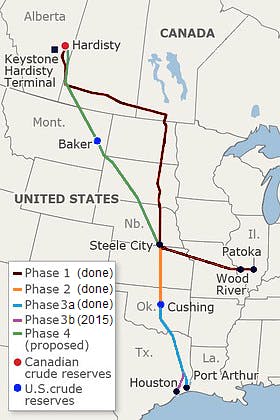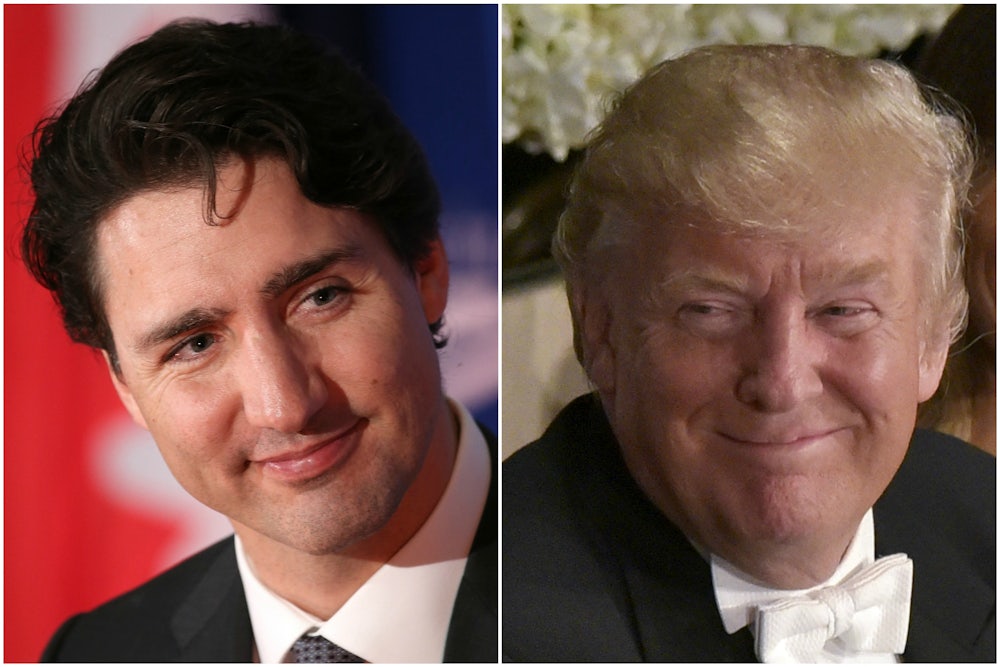Last year, the Liberal Party of Canada swept to power in an unexpected rout, ending nearly a decade of Conservative leadership. Out went Prime Minister Stephen Harper, who had turned Canada into one of the world’s top climate villains, and in came Justin Trudeau, a smart, handsome, charismatic heir to a political dynasty who made progressives throughout North America—including President Barack Obama—swoon. Trudeau promised to repair relations with indigenous people, put a price on carbon and reduce its pollution, welcome an additional 25,000 Syrian refugees, and appoint a gender-equal cabinet.
This year, in America, quite the opposite happened. After eight years of Obama’s progressive rule, Donald Trump unexpectedly won the presidency with promises of a different kind of change: to ban Muslims, deport millions of undocumented immigrants, build a wall along the entirety of the Mexican border, repeal Obamacare, and pull out of the Paris Agreement on climate change (after all, he has said that the “concept of global warming was created by and for the Chinese in order to make U.S. manufacturing non-competitive”). His cabinet thus far is made up almost entirely of white men.
As leaders, Trudeau and Trump could not be more different. But a shared interest could bring them together: reviving the Keystone XL Pipeline expansion.
“He actually brought up Keystone XL and indicated that he was very supportive of it,” Trudeau said at an event last week, referring to Trump. “I’m confident that the right decisions will be taken.”
The “right decisions,” as Trudeau sees it, is for the U.S. to approve the pipeline. After Obama rejected it last year, Trudeau said he was “disappointed by the decision.”
“We haven’t seen [Trudeau] be willing to stand up to the oil lobby,” explained Mike Hudema, a Canadian environmental activist who has worked for Greenpeace and Global Exchange. “And that’s really what it comes down to if you look at climate action in Canada. We’re moving forward on a lot of different fronts, but the major gap is in tackling emissions in the oil and gas sector.”
Had Hillary Clinton won the election, Keystone would have remained a non-starter; she came out against the pipeline before Obama’s decision. But now that Trump has won, will Trudeau break liberal hearts by forming a pro-carbon odd couple with him?

The Keystone Pipeline System, which is owned by TransCanada, is a network of crude oil pipelines that carries bitumen from Alberta, Canada, to southern Illinois and Texas’s Gulf Coast. The first phase of the project came online in 2010, and several more phases have followed. But the fourth phase of the project—known as Keystone XL, a 1,179 mile connection between Alberta and southern Nebraska—faced opposition from Nebraskans, and soon became the U.S. environmental community’s top domestic target.
TransCanada, Keystone’s owner, says the XL pipeline “will create thousands of much-needed jobs for Americans, increase tax benefits for counties and communities, and provide a safe, secure, reliable source of energy to help fuel the everyday lives of Americans.” Environmentalists warn of potential spills and say that increasing transportation capacity will only encourage further oil exploration and consumption. “I can’t imagine a situation in which we could support new pipelines,” said Patrick DeRochie, a climate and energy program manager at Environmental Defence Canada. “These pipelines are made to operate for 40 or 50 years. How can we be talking about moving toward decarbonization by 2050 and lock in high-carbon fossil fuel infrastructure?”
The claim of “thousands of jobs,” even though the exact number is in dispute, explains why Trump vowed last year:
If I am elected President I will immediately approve the Keystone XL pipeline. No impact on environment & lots of jobs for U.S.
— Donald J. Trump (@realDonaldTrump) August 18, 2015
Trump later said he’d want the U.S. government to get 25 percent of the profits, which may well be illegal. This August, his campaign said that he would ask TransCanada to resubmit its proposal for the fourth phase. Trump is also reportedly exploring whether to rescind a 1968 executive order by President Lyndon B. Johnson that grants the State Department approval power over cross-border pipelines—though such a move hardly seems necessary, given that Trump’s pick for secretary of state is Exxon Mobil CEO, Rex Tillerson.
TransCanada, for its part, “remains fully committed” to the pipeline’s construction and is “evaluating ways to convince the new administration on the benefits” of Keystone XL. So, apparently, is Trudeau. After Trump’s victory in November, the prime minister said he looked forward to working with Trump “on issues such as trade, investment, and international peace and security,” and that the nations’ “shared values, deep cultural ties, and strong integrated economies will continue to provide the basis for advancing our strong and prosperous partnership.”
Trudeau is diplomatically obligated to congratulate the president-elect of the U.S., of course, but working closely with Trump could hurt Trudeau’s credibility at home. According to a poll from Journal de Montreal, 70 percent of Canadians have an unfavorable opinion of Trump. And some environmentalists are already souring on Trudeau after he approved the Kinder Morgan and Line 3 pipelines in November.
“I think [collaborating with Trump on Keystone] would be very detrimental to Prime Minister Trudeau’s image as an environmental leader,” said Hudema, “but I think that the fact that he’s already approved two massive tar sands expansions has already done damage to that reputation.”
Trudeau paradoxically defends pipelines as a way to grow the economy in order to invest in a greener future. “We owe it to ourselves to make our economy more competitive, and to our kids to leave them a cleaner environment,” he said in a statement after approving the two pipelines. “But we also know that this transition will take investment, and it won’t happen in a day. We need to create good jobs and strong growth to pay for it.”
Elizabeth May, Canada’s Green Party leader, suggests that Trudeau has been all talk on climate. As a candidate, she said, “He promised a brand more than he promised specific promises. Canada’s negotiating position in Paris shifted from being saboteur and laggard, as we were for ten years under Harper, to being a very progressive, strong advocate for the Paris agreement.” But Trudeau didn’t promise a new emissions target, and thus, “the Liberals adopted the weakest of the Harper targets”: a 30 percent reduction from 2005 levels by 2030. (The United States has pledged to reduce emissions by 26-28 percent by 2025.)
“He is a father of young children,” May added. “The fact that his climate plan will not save his own kids from climate disaster because it’s way too weak to avoid two degrees, much less stick to 1.5, is something he ought to be considering.”
Even if Trump wants to approve the Keystone XL, and his State Department obliges, it might be thwarted by other means. According to May, the pipeline could face market challenges as long as crude oil remains below $80 a barrel (it’s currently worth about $53, a recent high). And a revival of Keystone would also likely be met with lawsuits and First Nation protests, as the Kinder Morgan and Dakota Access pipelines have been.
“We are expecting to see a lot of mobilization,” Susan Casey-Lefkowitz, a leader in the 2015 protests against Keystone with the National Resources Defense Council, thinks the anti-pipeline movement will stay strong. “There’s something about oil and gas pipelines that really calls on people to take to the streets because these pipelines tend to affect the communities where they live; they affect water that farmers and ranchers depend on if there are spills.”
Then again, those protests occurred under perhaps the most environmentally friendly administration, ever. Influencing Trump will prove much more difficult.
“Well, people have done what they can, but we have no magic weapon that wards off the fact that the fossil fuel industry will now control all branches of the federal government,” said Bill McKibben, the co-founder of 350.org. “We will resist in all the peaceful ways we can—in courtrooms, in state and local hearing rooms, in the streets. What else can we do?”
